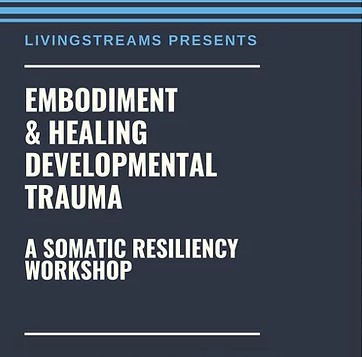Embodiment and Healing Developmental Trauma: A Somatic Resiliency Workshop
Location: Singapore
Date: 25 - 28 March 2022 (ONSITE)
Time: 9:00am – 5:00pm (SGT time)
In this workshop we will explore the neurophysiological and somatic underpinnings of healthy relationship and how to support and educate clients using an experiential model of learning. How we communicate and receive others is learned during our first attachment experiences with our primary caregivers such as our parents and, perhaps, even prior to our own conception through epigenetic and transgenerational influences. Relational dynamics with friends, partners, colleagues, loved ones, adversaries and others all stem from these early connections and experiences.
Many relational and attachment fields recognize that physiology needs to be a primary focus of trauma-sensitive healing. This workshop will present a dynamic toolkit of body-oriented psychophysiological approaches to stabilize early developmental symptoms of trauma as well as re-regulation the nervous system using interoceptive awareness techniques.
Interocpetion, or one’s on experience of bodily sensation, gives us information about the state our our “neuroception” (embodied perception) of basic safety, alarm, or life-threat. For many traumatized individuals who have experienced preverbal and/or developmental trauma, they are looking for ways to resolve re-enactment or symptomatic re-experiencing from trauma patterns and have new flexible internal and external responses in current relationships. The feeling one can experience with earned secure attachment is an internal state of increased homeostasis in which you have a resting cardiac rhythm, normal circulation, and can digest your food.
Often, we have experienced and learned less than optimal verbal and non-verbal communication skills.These dynamics are software, not hard wired and, therefore, are changeable via neuroplasticity. In this workshop we will look at how early attachment and bonding experiences set the stage for communication and relationships early and later in life with the body and physiological states being the primary vehicles of communication. You will learn several skills throughout the training to enhance your ability to provide effective relational repair work within therapeutic settings.
Objectives
1- Learn about and experientially connect with the physiology of self-regulation and co-regulation in early life
2- Identify and apply somatic repair interventions with classical attachment styles
3- Work with developmental movement re-patterning
4- Sense and learn to work with cycles of relational rupture and repair
5- Contrast and review classic psychological character structures with somatic psychological models
6- Explore relational affect within the body
7- Learn skills to provide embodied relational repair work within therapeutic settings
Subscribe to Email List
To receive updates from Dr. Abi Blakeslee regarding new article releases, upcoming trainings, and 2019 online consultation dates, click the button below to enter your contact information.

